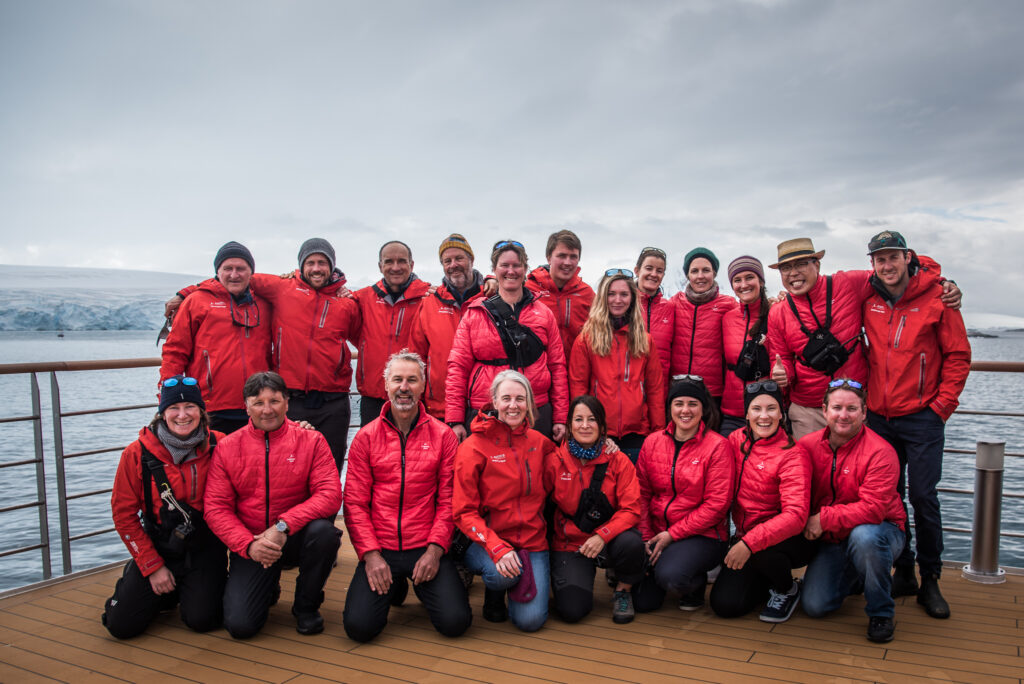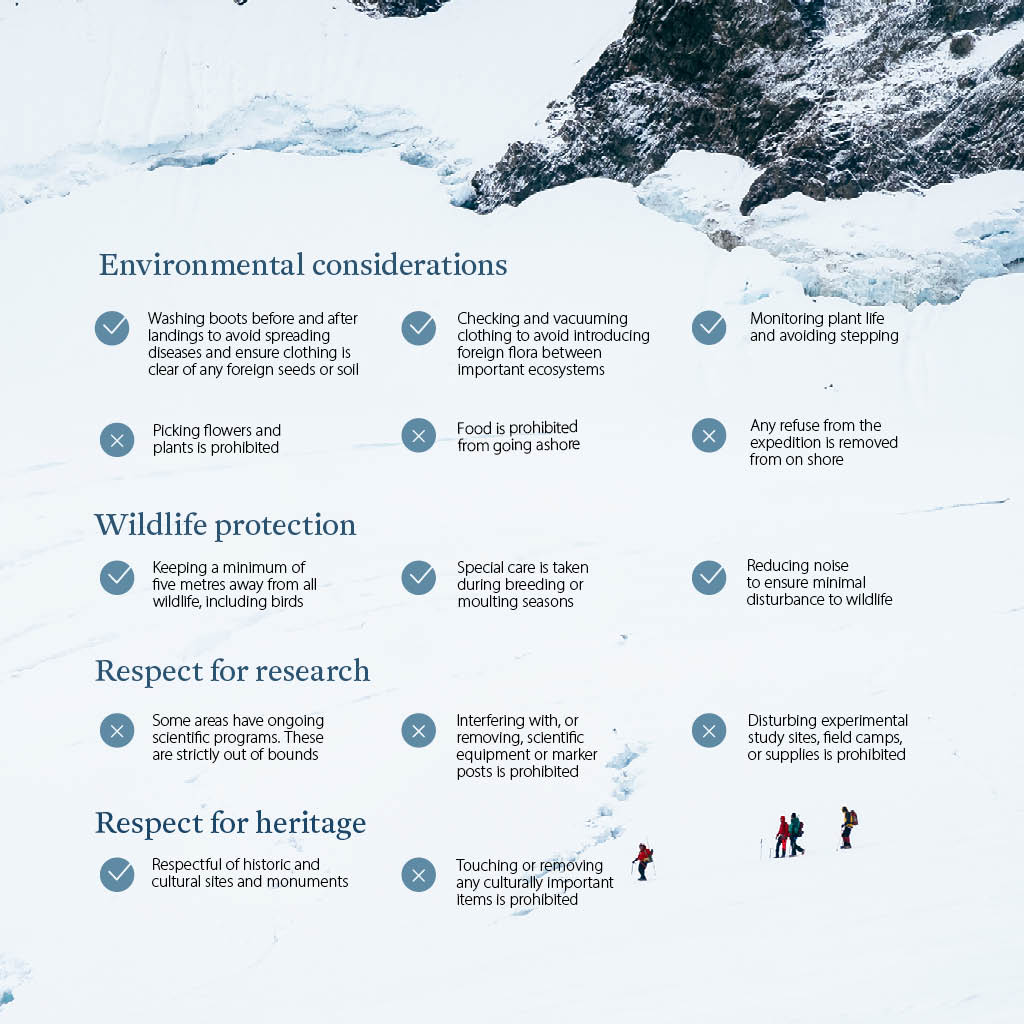Our unwavering commitment to the strategies laid out in our 2022-2023 Impact Report underscores our dedication to creating a lasting positive impact by creating lifelong ambassadors for the planet and striving to be the global leader in sustainable expedition travel.
From championing SGGs to adhering to MARPOL standards to strengthening relationships with like-minded organisations including AECO and IAATO – read on to learn 10 ways we’re making a positive impact
1. Maintaining our status as a 100% Climate Neutral company
We proudly maintain our 100% Climate Neutral certification in collaboration with South Pole, a renowned climate solutions leader. While we acknowledge that achieving net-zero emissions is our ultimate goal, our commitment to being climate neutral is an immediate step towards combating climate change while we work to decarbonise our operations.
2. Fostering an expert and diverse team
As a global expedition company, we seek to create a diverse workforce that reflects the global population. Within the extended Aurora extended family, 22 languages are spoken, and 61% of our workforce are women.
Our highly experienced Expedition Team – all specialists in their chosen fields – observe and interprets the planet’s unique landscapes and ecosystems in real time, sharing with passengers their knowledge, passion and care for the wild and extraordinary places we explore, fostering a deep appreciation for the planet.
For many Expedition Team and staff, our leading sustainability initiatives are one of the key reasons our Expedition Team choose to work for Aurora.

3. Taking action with clean up initiatives
We actively participate in major clean up initiatives, such as Clean Up Svalbard and Clean Up Iceland, contributing to coastline restoration. Our efforts extend globally with initiatives like Clean Up for Sarah, honouring Sarah Auffret, a beloved environmental advocate. We also support Take 3's CEO Clean Up, which has already removed over 56,000 pieces of rubbish in Sydney.
4. Safeguarding fragile ecosystems
We lead expeditions with a strong commitment to safeguarding delicate ecosystems, local communities and cultural heritage. Our stringent measures ensure minimal environmental impact while promoting responsible practices on land and sea.
Some of these actions include, but are not limited to:

5. Championing SDGs
We support seven Sustainable Development Goals (SDGs) – designed by the United Nations to enhance health, education, equality, economic growth, climate action and ocean and land regeneration, combining to drive impactful global change.
The key areas we have committed to focusing on are:
- Quality Education
- Decent Work and Economic Growth
- Industry, Innovation and Infrastructure
- Responsible Consumption and Production
- Climate Action
- Life Below Water
- Partnerships for the Goals
6. Implementing environmental management systems
Efficient environmental management is integral to reducing our footprint. We meticulously handle waste and water onboard and in the places we visit, in strict accordance with the International Convention for the Prevention of Pollution (MARPOL) requirements. Initiatives like eliminating single-use plastics underscore our commitment to continuous improvement.
7. Nurturing collaborative partnerships
Our ethos revolves around collaboration. By forging partnerships with like-minded individuals and organisations, we amplify our efforts and contribute to a shared vision of positive change.
8. Embracing technological progress
Our commitment to minimising fuel impacts drove our transition to state-of-the-art ships featuring sustainable technologies. Innovative designs like Ulstein’s X-BOW® enhance efficiency, while shore-based power, reusing heat from the engines’ coolant and exhaust systems, and emission reduction systems contribute to minimising the effects of emissions.
9. Minimising emissions
Our sustainability journey continues through ongoing evaluation and adoption of alternative technologies. We continue to explore exploring innovative solutions to minimise our ecological footprint while prioritising safe and responsible operations.
Let's take our decision to implement a dynamic anchoring system over physical anchoring. We had to carefully weigh up the pros and cons of each, and arrive at a solution that, while not perfect, minimises harm to the seabed and reduces GHG emissions.
Dynamic Anchoring
Benefits
- We can minimise environmental impacts in areas with fragile seabeds or in more shallow waters with a higher risk of anchoring on coral
Challenges
- Main engine is used for propeller and bow thruster power, retaining the ship's position
- Increases the fuel usage, releasing additional GHG emission
Physical Anchoring
Benefits
- Allows us to turn off the main engine and only use the auxiliary generator
- Uses less marine gas oil (MGO) and emits less GHG emissions
Challenges
- Dropping a physical anchor poses a risk to coral and other life on the seabed
10. Empowering through Education and Enrichment
Engaging passengers and teams in Citizen Science projects, recognising female conservationists on the Sylvia Earle’s decks, and supporting global climate change education fosters a deeper connection to these remote areas and aligns with our mission to create lifelong ambassadors for the planet.
Our actions, including Clean Up initiatives, technological progress and education efforts, embody our mission to nurture lifelong ambassadors for the planet and are helping us to create lasting positive impacts.
Discover more in our detailed Impact Report, a testament to our relentless pursuit of a more sustainable future.


